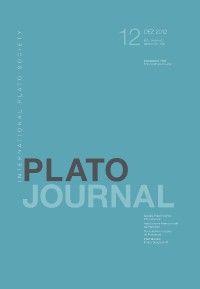Please use this identifier to cite or link to this item:
https://hdl.handle.net/10316.2/42171| Title: | Plato's Republics | Authors: | Tarrant, Harold | Issue Date: | 2012 | Publisher: | Imprensa da Universidade de Coimbra | Abstract: | Various ancient sources refer to the Platonic work that we know as Republic in the plural. Aristotle seems to have made it possible to refer to politeiai as ‘constitutions’, actual or written, and therefore some of our texts are best explained as references to Plato’s two written constitutions, Republic and Laws. One neglected reference that may perhaps be explained in this way occurs in the anonymous Antiatticista. A large number of references from the Alexandrian school of Platonism in late antiquity cannot be explained in that way, and should be understood with reference to the prevalent interpretation of the Republic, which gives equal weight to the internal (psychic) and external (civic) constitutions. The trickiest question is what it means in the titles of three commentaries dating from the early imperial era. | URI: | https://hdl.handle.net/10316.2/42171 | ISSN: | 2079-7567 2183-4105 (PDF) |
DOI: | 10.14195/2183-4105_12_5 | Rights: | open access |
| Appears in Collections: | Plato Journal |
Files in This Item:
| File | Description | Size | Format | |
|---|---|---|---|---|
| plato_s_republics.pdf | 893.9 kB | Adobe PDF |  |
Items in DSpace are protected by copyright, with all rights reserved, unless otherwise indicated.
